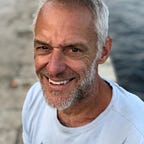Solving For X
“It’s a basic equation, Joe,” Fritz enthusiastically conveys to me.
“X1 + X2 + X3 + X… = Your best performance,” he continues. “Identify your variables, make each one as good as you possibly can, and this is your optimal performance.”
Motivating me, the young athlete, may not have been too difficult. And our coach, Fritz Haller, who guided the final chapter of our gold medal-winning journey at the 1992 Olympic Games, had an excellent knack for doing this, as he did in this particular conversation around his dining room table about two years before the Olympic race.
The goal that I wanted was presented as an equation of addition and maximization.
Today, and many years downstream of this conversation, my own peak performance equations involve much more introspection about what to subtract rather than what to add. What to minimize rather than maximize.
Each one of us builds a unique path to improvement. But, a shared commonality is the need to identify the correct variables.
Or more simply said, Solving for X.
Failing to correctly identify X leads us to minimize or maximize the wrong variables.
Solving for X is our experiment of a lifetime. Lots of trial and error. Never an exact science. After all, the river is always moving… which means we are always in a state of change. Always in a state of course-correction.
A few months ago, I had wonderful conversation with a friend, Michael Kay. We spoke about the conditions that help us to better evaluate and understand the variables that lead us towards meaning, growth, and connection to what matters most.
Our sub-conversations within the podcast include:
Acknowledging our rocks in the river as guiding companions, not as our obstacles: From last week’s post, judging from the replies and social shares, this is a deeper dive into the most popular reflection of the 52 questions. (6:20–10:05)
Centering ourselves for the challenge of working with our rocks: The importance of being counterintuitive. (10:20–14:00)
Gratitude & Coaching Philosophy: In the biggest moments of life, how do we turn inward? (28:50–32:00)
How to start a morning routine: It doesn’t take hours — it begins with just five minutes. Here’s my suggestion for starting. (35:50–40:15)
Some personal background on me: If you have been reading along here for a while and ever wondered who I am, this part of the conversation highlights my younger years growing up in the sport of canoeing. (15:00–20:15))
Our conversation takes place within the confines of Michael’s personal project, which he calls Chapter X. While Chapter X focuses on the pursuit of life meaning beyond work, the structure of our discussion makes me wish I had listened to this during earlier athletic, executive, and entrepreneurial stages of my life.
So, re-fill your cup with this morning’s beverage and please enjoy our conversation HERE.
With gratitude,
-Joe
Connect with Joe:
Joe Jacobi is an Olympic Gold Medalist and Performance Coach who collaborates with leaders & teams by getting them outside the day-to-day rush of life and bringing focus to what truly matters most.
His strategies and concepts help clients, including sales and technology executives, doctors, senior-level bankers, and military leaders, to perform their best without compromising their lives.
Joe continually practices and refines his core principles and strategies via his own life and pursuits at his Pyrenees mountains home beside the 1992 Olympic Canoeing venue in La Seu d’Urgell in the Spanish state of Catalunya — the same canoeing venue where along with his canoeing partner, Scott Strausbaugh, Joe won America’s first-ever Olympic Gold Medal in the sport of Whitewater Canoe Slalom at the 1992 Olympic Games.
